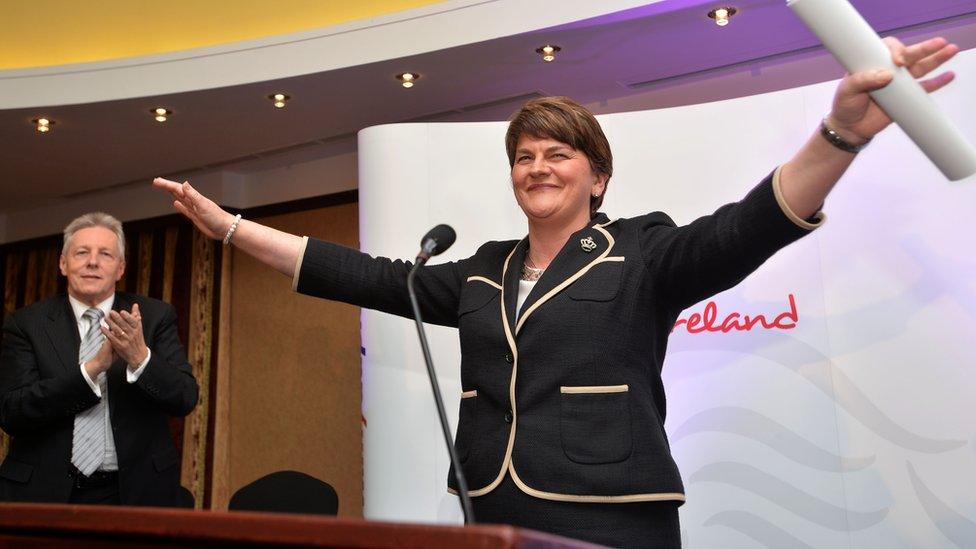'No deadline' for DUP-Tory deal says Nigel Dodds
- Published
- comments
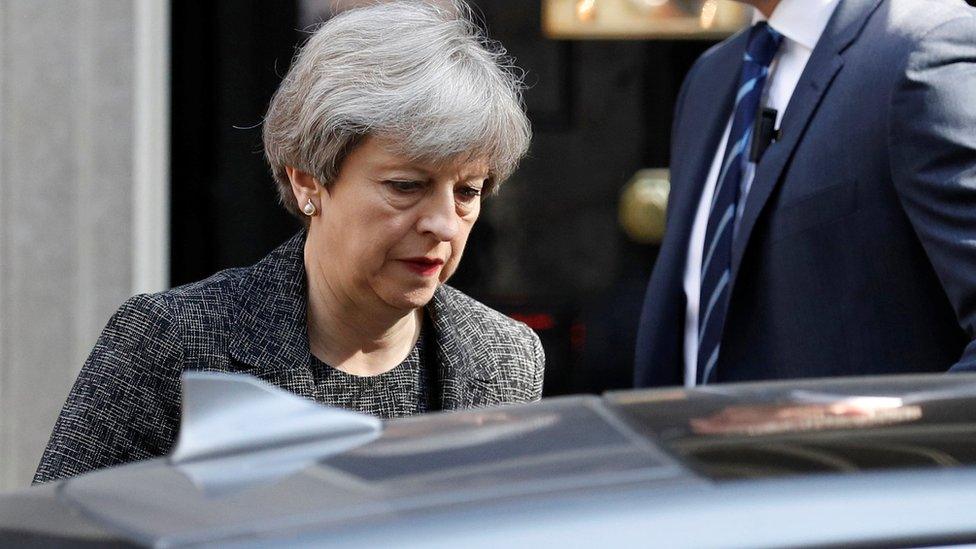
Theresa May held talks with the five Northern Ireland parties at Downing Street
There is no deadline for a deal between the Democratic Unionist Party (DUP) and the Conservative Party despite a date being set for the Queen's Speech, the DUP's deputy leader has said.
The government confirmed the speech, which sets out its priorities, will take place next Wednesday.
Nigel Dodds said that the speech was "not relevant" to their negotiations.
His comments came after Northern Ireland's main parties held talks with Theresa May.
The DUP, Sinn Féin, the Ulster Unionist Party (UUP), Alliance and the Social Democratic and Labour Party (SDLP) had separate meetings with Mrs May.
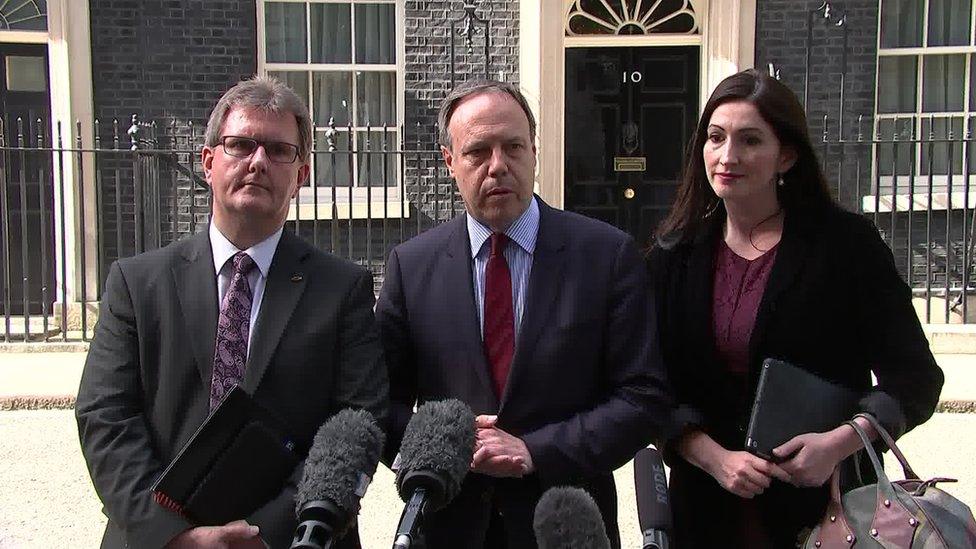
Nigel Dodds said that deadlines can be "counter-productive"
Following the meetings the prime minister said their focus was on restoring devolved government in Northern Ireland before the 29 June deadline set by the Westminster government.
She said: "My government remains absolutely committed to doing everything we can to help take this process to a successful conclusion, remaining steadfast to our commitments in the Belfast Agreement and its successors.
"The Northern Ireland secretary will continue to engage with the parties before this crucial deadline and if no resolution is reached then we will need to consider what steps we need to take, to ensure Northern Ireland has the political stability it needs," she added.
The prime minister had also spoken to the newly elected Irish taoiseach (prime minster), Leo Varadkar, earlier on Thursday and the two leaders agreed to meet "at the earliest possible opportunity".
DUP deal
Mrs May has already held talks with the DUP this week about a deal to support her minority Conservative government.
DUP sources told the BBC on Wednesday an announcement on a deal with Tories had been delayed because of the tragedy of the Grenfell Tower blaze.
A deal is not expected to be confirmed before next week, although Mr Dodds said that he was not going to "get into timetables and deadlines".
"They can be somewhat counter-productive," he added.
He also said that the Queen's Speech was a "entirely separate matter for the government".
"It's quite proper that a date for the Queen's Speech should be set and that should proceed but that's separate from the discussions that we're having now."
Mr Dodds said the party "stands ready to form an executive in Northern Ireland without any pre-conditions or red lines".
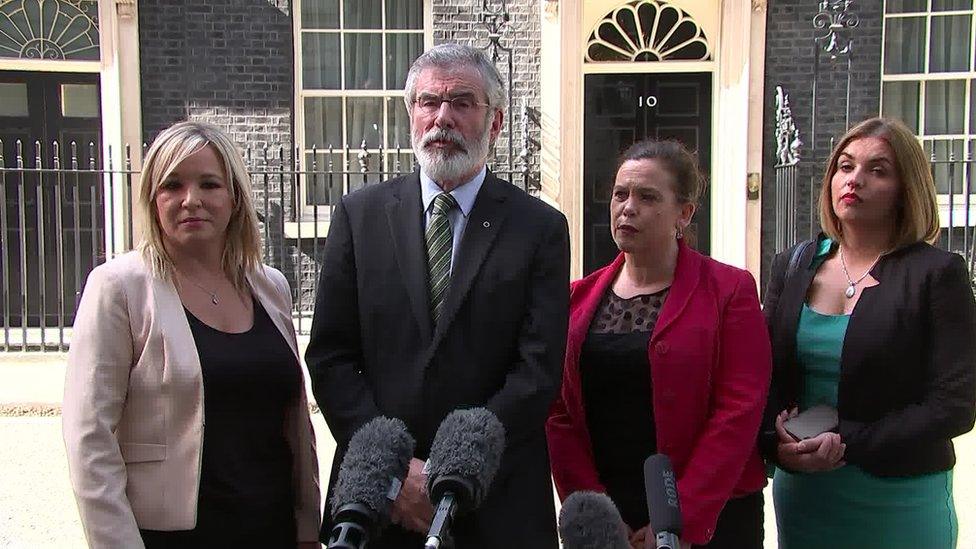
Gerry Adams ruled out Sinn Féin ending its abstentionist policy at Westminster
However, some parties have criticised the ongoing negotiations between the DUP and Conservatives over how they might impact on talks in Northern Ireland.
The 1998 Good Friday Agreement commits the UK and Irish governments to demonstrate "rigorous impartiality" in their dealings with Northern Ireland's political factions.
Sinn Féin, the SDLP and Alliance have all said Mr Brokenshire cannot chair the ongoing process to restore power-sharing at Stormont due to the perceived conflict of interest.
'Devil is in the detail'
Other senior political figures, including former prime minister Sir John Major, have warned the government would compromise its stated impartiality in Northern Ireland if it entered a confidence and supply deal with the DUP.
Speaking at Downing Street, Sinn Féin leader Gerry Adams said that the party told Mrs May "very directly that she was in breach of the Good Friday Agreement" over the Conservative negotiations with the DUP.
Michelle O'Neill, Sinn Féin's northern leader, said: "She says she is committed to her role as co-guarantor of the agreement. She gave us assurances in relation to that, however, the devil is always in the detail."
"We made it very clear that any deal between herself with the DUP cannot undermine the Good Friday Agreement."
Mr Adams also ruled out the party, which has seven MPs, ending its abstentionist policy at Westminster and taking its seats in parliament.
"We're Irish republicans, we've just been elected on a certain mandate - that mandate is that we won't interfere in British affairs, that we won't take an oath of allegiance to the English queen, no harm to her."
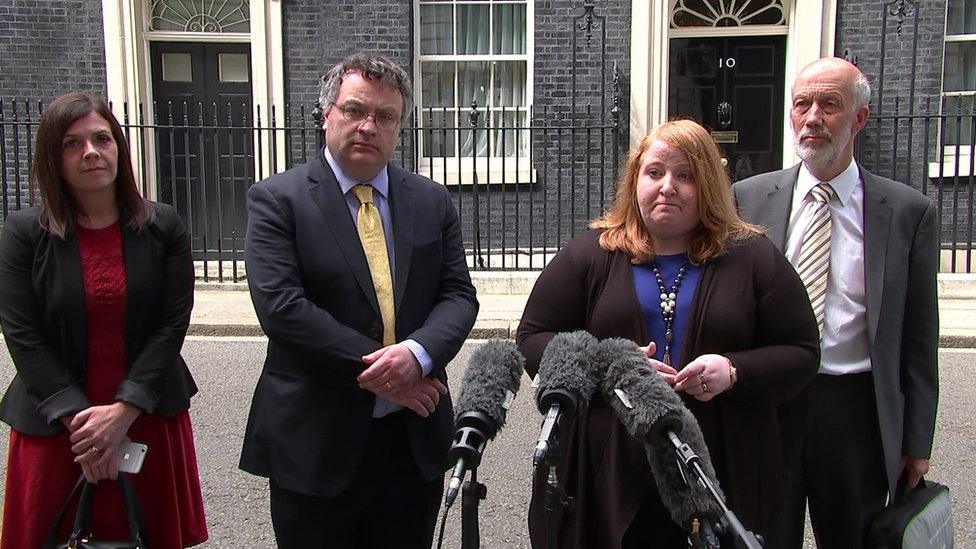
Naomi Long said that the government's "actions would speak louder than words"
Alliance Party leader Naomi Long said that "actions speak louder than words" when it comes to the government's impartiality in the talks.
"She (Mrs May) did not tell us the detail of the deal, nor did she tell us she had a deal nailed down," said Mrs Long. "She simply said that they were working on an arrangement for confidence and supply."
Mrs Long added: "She sought to give us reassurance on the issue of neutrality but we have to be practical about these things."
SDLP leader Colum Eastwood said that a deal between the government and the DUP cannot be one that gives the DUP power over the Conservative Party.
"We have to judge it on its merits and see what the deal looks like," he said.
"I think this (Stormont deal) can be done by the end of June, it requires a change of attitude from the rest of the parties and requires the British government to prove to the rest of us that they are not under the thumb of the DUP."
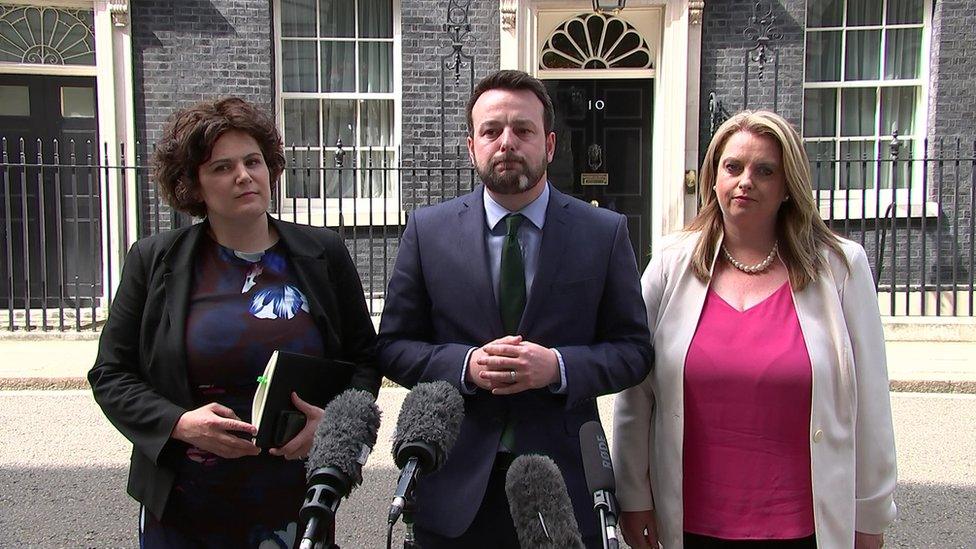
SDLP leader Colum Eastwood said the government would have to prove it is not under the thumb of the DUP
UUP leader Robin Swann said that Mrs May reassured him that the "entire deal (with the DUP) will be made public".
"One thing we have made clear to the prime minister is that we are concerned that any deal reached is open and transparent and that everybody gets to see the entire negotiation."
He added that calls from other parties for the NI Secretary to be replaced as chair of the talks is a "side show" and a "waste of time and a distraction".
Meanwhile, Labour leader Jeremy Corbyn has demanded details of any Conservative-DUP deal, calling it a "nonsense situation".
The Conservatives are having to rely on the support of 10 DUP MPs after they fell eight seats short of winning an overall majority at the general election.
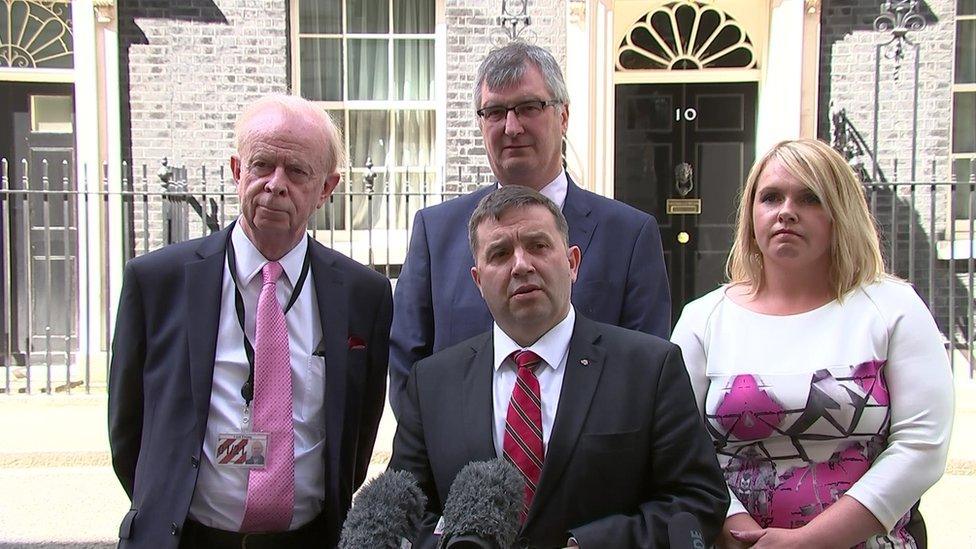
UUP leader Robin Swann said it was a "waste of time" to replace the NI secretary as chair of the Stormont talks
It means Mrs May will remain as prime minister and the DUP MPs will be central to the survival of a Conservative Party administration.
Devolved government in Northern Ireland broke down in January.
The late deputy first minister, Martin McGuinness, stood down in protest at the DUP's handling of an energy scandal, in a move that triggered a snap election.


- Published14 June 2017
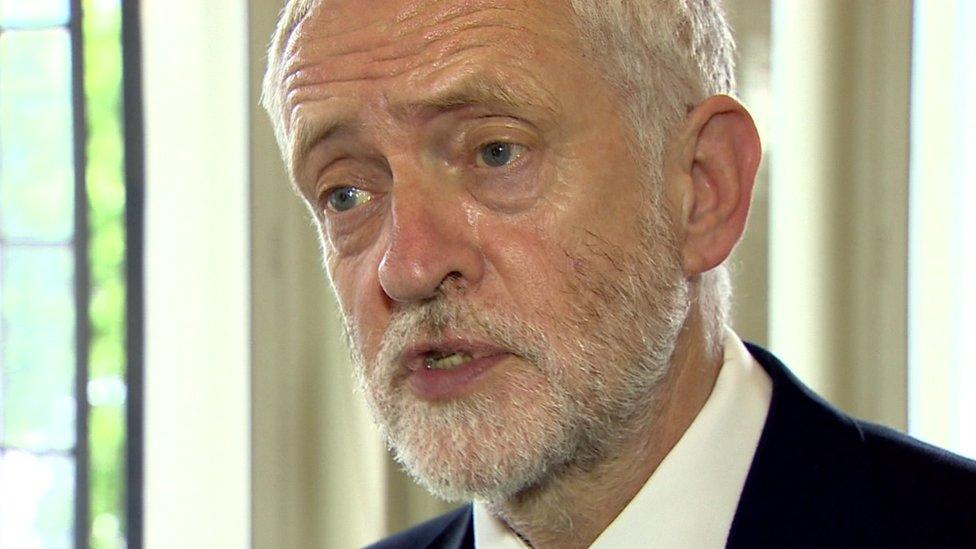
- Published10 June 2017
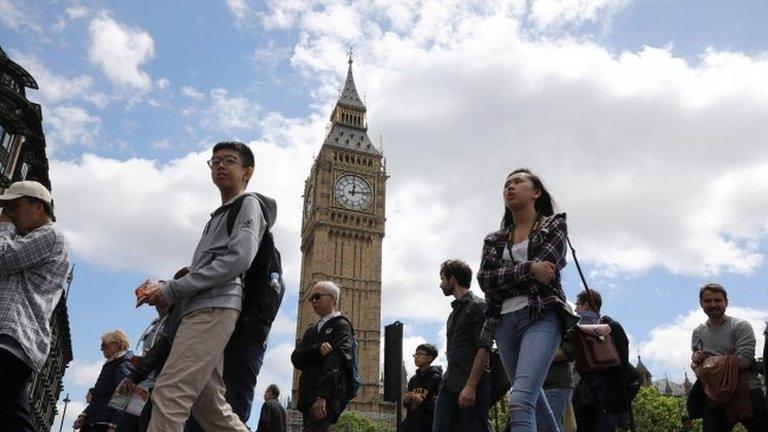
- Published13 June 2017
